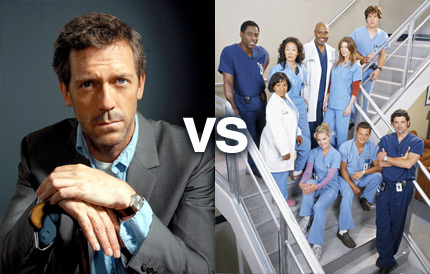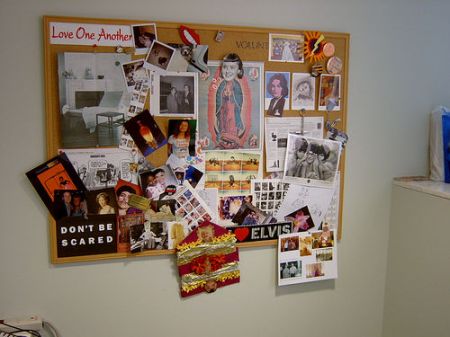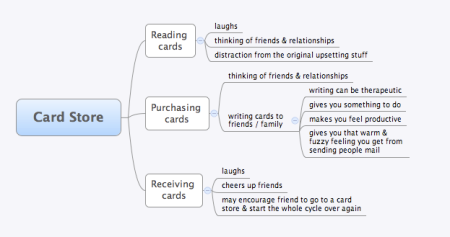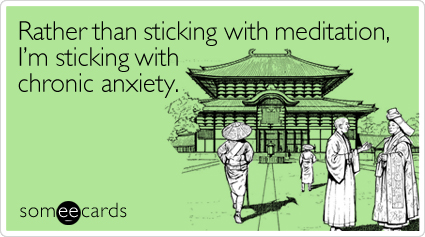Posts Tagged ‘coping skill’
October 27, 2009
This is the sixth post in the Grey Thinking series, Five of the most underrated coping skills.

This isn’t going to come as any surprise to those of you who have followed Grey Thinking for any length of time…. but watching DVDs of TV series is one of my favorite “coping skills.” I may be stretching the idea of a “coping skill” a little bit here, but anything to justify my House marathons…
I like to watch four hours of old Grey’s Anatomy episodes (especially during evenings that I’m depressed) because I can check out. I can focus on Meredith’s dark and twisty issues and secretly hope that Meredith and Derek get back together (clearly I’m in the middle of season three right now). And it’s not that House’s misery or Meredith’s really screwed up love life makes me feel better about my own or anything. I just like relationships. And sarcasm.
Checking out like this is probably not THE healthiest coping mechanism – but it’s much better than the eating disorder. Sometimes I am overwhelmed and I need to check out. It’s hard for me to turn off my brain, in a sense. My mind can wander while I read a book, exercise, walk the dog, clean, etc. For some reason though, my mind doesn’t wander when I’m watching House. Things seem so still and the chaos of my life is put on hold.
I say “DVDs” rather than House / Grey’s Anatomy because I have friends who use movies to cope. Personally, I get really impatient with movies and spend a lot of time thinking “is it over yet?” They’re more frustrating to me than soothing… but to each her/his own.
Tags:Anorexia, binge eating disorder, bulimia, coping mechanism, coping skill, dark and twisty, derek, dvd, eating disorder, EDNOS, grey's anatomy, House, meredith, tv marathon, tv series
Posted in coping skill | 2 Comments »
October 25, 2009
This is the fifth post in the Grey Thinking series, Five of the most underrated coping skills.
I’m not sure that “crafting” really encompasses the coping skill that I want to mention, but it’s the best term that I could come up with. When I say “crafting,” I mean any of the following:
- coloring
- making collages
- sudoku /crossword puzzles
- word searches
- computer solitaire
- kitting
- drawing / painting
- origami
…see my point? Semi-creative (and low-stress) activities that keep your hands busy. I don’t know what it is about keeping my hands busy, but it really helps with the anxiety.
Personally, I prefer coloring & sudoku… mainly because they don’t really require any thought. I can stress out about drawing because I don’t know where to start or I am worried about screwing it up. With coloring… it’s way harder to screw up and limited decisions have to be made. I know people who really get a lot more out of art than just being distracted and it can really be therapeutic for them. I have days like that, but usually I’m just looking for a good, basically mindless activity.
Tags:Anorexia, bulimia, collages, coloring, coping mechanism, coping skill, crafting, crossword puzzles, drawing, eating disorder, ED treatment, knitting, mindless activity, origami, sudoku, word searches
Posted in coping skill | 1 Comment »
October 23, 2009
This is the fourth post in the Grey Thinking series, Five of the most underrated coping skills.
If you don’t know what a “kudos chart is” – it’s a sticker chart. You know those charts that your mom made when you were five that had actions like “make bed” and “brush teeth” on it? Yep, those. I heard someone refer to them as “kudos charts” on twitter several months back, and since my current chart is not actually using stickers, I’m going to go with that terminology.
My explanation is simple: a kudos chart worked for me when I was five, and twenty years later it is still a helpful tool.
What kind of things do I have on my kudos chart?
- Follow meal plan
- Take calcium supplement
- Get 7+ hours of sleep
- Go through the mail
- Blog
That’s not all, but you get the picture – it’s a mixture of eating disorder goals and regular life tasks. I never have more than 7 goals, for three main reasons:
- then I’m not really focusing on the important tasks
- it gets cumbersome to remember and record too many things
- only seven fit on my chart
Not only do I get satisfaction of checking off items each day, but at the end of the day / week I add up all my “kudos” for my “kudos score.” It’s a quick and satisfying way to motivate myself… and I think that other people could definitely benefit from such a tool.
Tags:Anorexia, binge eating disorder, bulimia, compulsive overeating, coping mechanism, coping skill, coping tool, eating disorder, eating disorder goals, EDNOS, goal chart, goals, kudos chart, sticker chart
Posted in coping skill | 4 Comments »
October 21, 2009
This is the third post in the Grey Thinking series, Five of the most underrated coping skills.
Out of sight, out of mind.
This idiom definitely proves true for me. I get so wrapped up in everything going on in life that I forget about all these health / self-care / positive affirmations / you name it that I’m trying to convince myself of.
I wrote about this in a previous post, I’m going to need that in writing, but it’s definitely worth mentioning again. I have a bulletin board above my desk with little things on it – quotes, pictures, etc. – that mean something to me. For example, there’s a fortune cookie fortune that says, “Remember there are people who care deeply about you.” There’s also a copy of my meal plan and clips from meaningful emails. Granted… there are also pictures of my dog, a yearly calendar, and sometimes a to-do list… but my point is, I put stuff up there that I need to remember. And it helps, a lot.
I know that in treatment and recovery, I need to hear the a lot of the same things over and over. Seeing some of these concepts concretely and being reminded of them regularly has proven to be very helpful.

Tags:affirmation, Anorexia, bulimia, bulletin board, bulletinboard, coping skill, cork board, eating disorder, EDNOS, fortune cookie, quotes, self-care, treatment
Posted in coping skill | Leave a Comment »
October 19, 2009
This is the second post in the Grey Thinking series, Five of the most underrated coping skills.
I don’t know why more people don’t hang out in card stores. Just think about it… when you have a friend that’s upset, it’s not uncommon to send them some kind of “cheer up / feel better” card. So, if you’re upset… doesn’t it just make sense to spend an hour in a card shop and read 100 of those?
I know that there is more to getting cards than the card itself (say… the thought behind it), but funny cards make people feel better. I scan the aisles at Barnes & Noble nearly weekly for new stickmen cards and can’t help but laugh at Hoops & Yoyo. Card stores are just a win-win for everyone.

Tags:Anorexia, bulimia, card store, cards, coping mechanism, coping skill, eating disorder, EDNOS, hoops and yoyo, recovery, stickmen, treatment
Posted in coping skill | 7 Comments »
February 13, 2009

Coloring aside (and other “active meditation,” I guess), there is something that I hate about meditation (guided imagery especially). Deep breathing maybe helps me when I’m starting to freak out, but I think that’s because I’m telling myself “chill, take a moment, calm down, relax, collect yourself, you’ll be okay.” However, breathing deeply does stop my heart from beating so quickly.
Meditation is different though. I think it’s frustrating and I feel so impatient with it. It’s supposed to be calming, but really it just wears on my attention span and my nerves. It’s like when you’re stuck sitting at a red-light in the middle of the night, and are the only car there. You are watching that light and a minute goes by…. another minute… and you start thinking, “Seriously? You have to be kidding.” Another minute goes by and you are convinced the thing is broken. FINALLY the light changes.
I’ve had several therapistic explanations for this:
- I think I am a human doing, rather than a human being.
- I am uncomfortable sitting with myself.
- Meditating is letting my guard down and I am afraid to make myself that vulnerable.
- That’s my eating disorder talking (which I don’t think is really even relevant in this situation, but I swear there are therapists who say this about everything)
I think I can sit with myself and be calm. I love long car rides, coloring, napping, walking the dog… if you don’t count any of these “sitting with yourself and being a human being,” then what else besides meditation fits into this category?
When I am feeling panicky and anxious, meditation is about the last thing in the world that I want to do. It sounds so wrong when you state it this way, but some degree of anxiety is less painful than meditation! I think it’s great that meditation is calming and refreshing for some people… but I am convinced that meditation is not for everyone, and that it’s not necessarily a symptom of mental illness.
Tags:Anorexia, anxiety, bulimia, chronic anxiety, coloring, coping skill, depression, eating disorder, ED recovery, ED treatment, human being, meditation, mental health, mental illness, napping, NEDA, panic attack, someecard, therapist, traffic light
Posted in Health, mental illness | 2 Comments »





